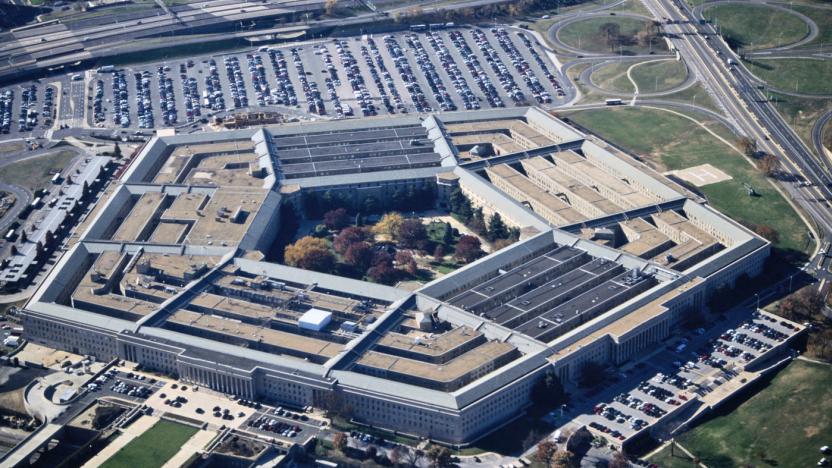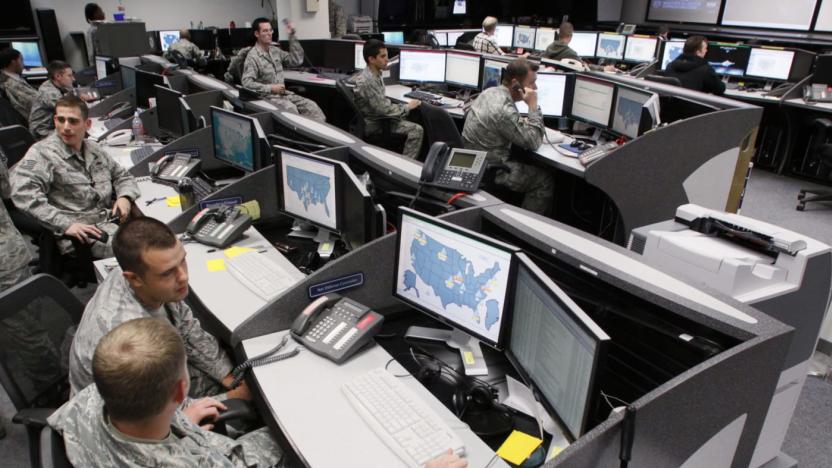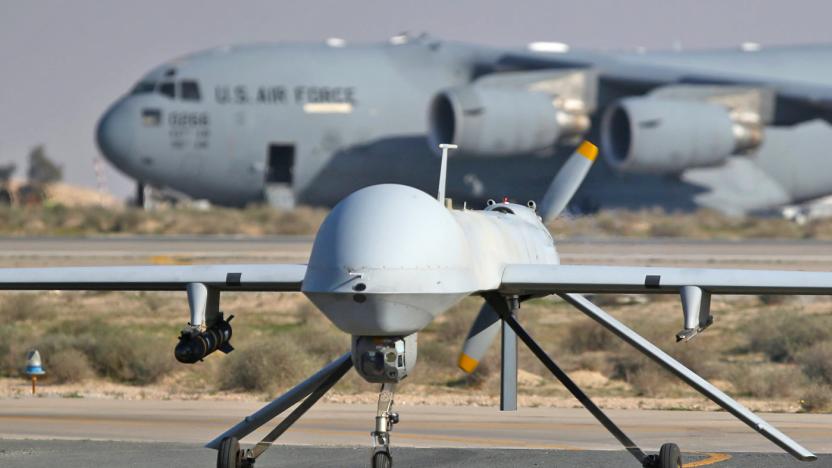Pentagon
Latest

US reportedly elevates the role of Cyber Command
Now that the US treats cyberwarfare as a staple of its combat operations, it's ready to raise the prominence of its internet warriors. Reuters sources say that the Obama administration is planning to elevate Cyber Command, turning it into a "unified command" that's just as crucial as a major regional section like Pacific Command. The proposed shuffle would also detach Cyber Command from the NSA, giving it more input on the use of online weapons and defenses.

Pentagon wants more people to hack its websites and networks
The Department of Defense's Hack the Pentagon program was apparently so successful, the agency has decided to extend and develop new initiatives for it. Similar to Facebook's, Twitter's and Google's bug bounty projects, Hack the Pentagon paid white hackers for the vulnerabilities they discovered on the department's websites. It ran from April 18th until May 12th, 2016 and doled out over $70,000 in rewards. However, the initial run only covered five public-facing online properties -- defense.gov, dodlive.mil, dvidshub.net, myafn.net and dimoc.mil. The department believes that the concept will also "be successful when applied to many or all of DoD's other security challenges."

The Pentagon isn't sure who'd be in charge during a cyberattack
According to a report published Monday by the Government Accountability Office, the Department of Defense lacks clear rules on who would be in charge during a national-level cyberattack. It could be the US Northern Command, which coordinates DoD homeland defense efforts with civil authorities, or it could be US Cyber Command, which handles the government's cyber security forces -- but nobody's quite sure who should handle what, or when.

Pentagon has deployed military drones in the US
If you were skeptical that the US military would only fly its drones in combat zones, your suspicions were well-founded -- although the situation isn't as bad as you might think. A recently published Department of Defense report has revealed that the Pentagon deployed spy drones in the US for non-military missions between 2006 and 2015. There were "less than twenty" of these flights, and the Department maintains that all of them obeyed laws restricting the use of these drones at home. While the document doesn't say what happened on those flights, the current policy forbids spying on US residents.

Alphabet's Eric Schmidt to lead military innovation board
Alphabet executive chairman Eric Schmidt will soon head up an advisory board for the US military. Defense Secretary Ash Carter revealed today that Schmidt had agreed to lead the Pentagon's new Defense Innovation Advisory Board. The group is tasked with leveraging the innovation of Silicon Valley to the US military by bridging the divide between the government and the tech industry. Secretary Carter announced the board during the RSA cybersecurity conference that's taking place in San Francisco this week, where he also plans to meet with the Schmidt.

Pentagon competition dares you to hack its websites
The US military already tests the security of its networks, but it doesn't feel that's enough in an era when cyberattacks are a constant reality. It's starting up an experimental competition, Hack the Pentagon, that invites private citizens (carefully screened, of course) to hack public Department of Defense websites. While the government is keeping sensitive systems off-limits, this will hopefully identify vulnerabilities that in-house experts wouldn't catch.

Feds change up how they do background checks after OPM hack
The White House is taking steps to prevent another massive security breach that can compromise the information of future federal employees. It plans to replace (and absorb) the Office of Personnel Management's background check division with a new one called the National Background Investigations Bureau. If you recall, the intruders that infiltrated OPM's network last year took millions of people's fingerprints, SS numbers, bank info and other personal details. NBIB will still be part of OPM, but it will be led by a presidential appointee. Plus, the data it collects won't be kept within its offices anymore.

Air Force drones had a record number of crashes last year
The Air Force has a huge drone problem that's costing the military division a pretty penny. A total of 20 drones were completely destroyed or sustained at least $2 million in damages when they crashed in 2015, according to The Washington Post. That's the highest number of mishaps within a year so far, over twice the number of accidents in 2014. Half of those incidents involve the military's favorite surveillance and airstrike machine, the Reaper drone, which costs the Pentagon $14 million each when fully loaded.

The Pentagon's plan to outsource lethal cyber-weapons
The Pentagon has quietly put out a call for vendors to bid on a contract to develop, execute and manage its new cyber weaponry and defense program. The scope of this nearly half-billion-dollar "help wanted" work order includes counterhacking, as well as developing and deploying lethal cyberattacks -- sanctioned hacking expected to cause real-life destruction and loss of human life. In June 2016, work begins under the Cyberspace Operations Support Services contract (pdf) under CYBERCOM (United States Cyber Command). The $460 million project recently came to light and details the Pentagon's plan to hand over its IT defense and the planning, development, execution, management, integration with the NSA, and various support functions of the U.S. military's cyberattacks to one vendor.

Runaway blimp prompts the US to freeze a missile defense program
That US Army radar blimp that ran amok didn't just trigger an internet frenzy... it may have put the brakes on a big military research initiative. Pentagon officials have frozen the JLENS (Joint Land Attack Cruise Missile Defense Elevated Netted Sensor System) program behind the blimp while they investigate what went wrong. The government isn't saying what it might do, but there are already politicians calling for the blimps to be cut. JLENS had already been hanging by a thread ever since 2010, when the Army threatened to kill it -- there are longstanding concerns about both the technology's reliability and its effectiveness compared to conventional aircraft. Don't be surprised if these defensive dirigibles vanish in short order. [Image credit: U.S. Air Force/Tiffany DeNault via Getty Images]

Pentagon launches cybersecurity exchange to combat hackers
The Department of Defense is taking a number of steps to up its cybersecurity game, Terry Halvorsen, the Pentagon's Chief Information Officer recently told a reporters breakfast hosted by The Christian Science Monitor. "There's not a time when I'm not being attacked somewhere in the world," Halvorsen said. "We're looking to industry to help us solve some specific areas." To that end, the DoD has begun assigning its civilian personnel to 6-month tours of private cybersecurity companies, such as Cisco, as well as inviting employees from those firms to help train its personnel to defend the DoD's networks against hacks.

Pentagon is building a system that instantly detects security breaches
The Department of Defense wants to be able to combat cyberattacks before hackers get the chance to steal sensitive files and employees' data, as well as access the country's weapons systems. The only way the Pentagon can do that is to be more proactive in dealing with its computers' and networks' vulnerabilities. That's why it's building an electronic system that can help them prioritize those flaws, according to how much threat they pose. While data entry will initially be done by hand, the military envisions its final form as an automated system that can instantly detect infiltration attempts and notify cyber response teams to stop them before they can wreak havoc.

$2 billion rocket company merger could create giant SpaceX rival
United Launch Alliance is a joint-venture between Lockheed Martin and Boeing that launches spy and navigation satellites for the Pentagon and Air Force. Now, the firm is the subject of a $2 billion bid from engine business Aerojet Rocketdyne, a company that's been snubbed in its attempts to power the Atlas V. If the government's shadowy army of intelligence analysts and accountants approve the deal, it could create a new aerospace behemoth that could leave Elon Musk shivering out in the cold.

Pentagon dives into advanced wearables with Apple, Harvard and others
The Pentagon wants to use wearables for more than just tracking steps. It's pouring $75 million over the next five years into the FlexTech Alliance -- a group made of 162 separate organizations, including Apple, Boeing and Harvard -- to create a "Manufacturing Innovation Institute for Flexible Hybrid Electronics." That may sound like a mouthful, but basically it will explore new ways soldiers can use advanced wearable tech. The findings could even make their way to military ships and aircrafts to monitor their structural integrity in realtime, Reuters reports. Additional funding from other companies and local governments will bring the total investment of the project up to $171 million. "I've been pushing the Pentagon to think outside our five-sided box and invest in innovation here in Silicon Valley and in tech communities across the country," US Defense Secretary Ash Carter said in a statement today. "Now we're taking another step forward."

US military wants more lethal drone strikes
Despite doubts about the effectiveness of US drone airstrikes in war-torn nations, the Pentagon wants to dramatically increase them. An unnamed official told the WSJ that military commanders intend to bump the number of daily flights by 50 percent. UAVs like the MQ-9 Reaper would not only aid with surveillance in regions like Ukraine, the Middle East and the South China Sea, but also perform more targeted missile strikes. The Pentagon says it needs the surge in drone activity -- the first since 2011 -- to deal with new conflicts in Syria, Iraq, Yemen and elsewhere.

Russia apparently gets the blame for hacking Pentagon email
A couple of weeks ago the Pentagon's Joint Chiefs of Staff suddenly shut down its unclassified email network for all users, but didn't say why beyond citing "suspicious activity." Now, anonymous sources and unnamed government officials have told NBC and The Daily Beast that investigators believe the network was compromised through a spear phishing attacked launched by Russia. The only problem? Even for anonymous sources, they're kinda light on evidence.

Pentagon and Silicon Valley cyberunit reveals leaders and HQ
The Department of Defense's partnership with Silicon Valley is a done deal, and now officials have announced who would serve as the initiative's head honchos. According to The Wall Street Journal, two former high-ranking military officials will lead the Defense Innovation Unit–Experimental or DIU-x project. George Duchak, the former director of Information Directorate (ID) at the Air Force Research Laboratory, will serve at its director. ID is in charge of the airmen's "command, control, communications, computers and intelligence and cyber technologies." Meanwhile, former Navy SEAL and Reserve officer Rear Adm. Daniel "Brian" Hendrickson will be the deputy.

Pentagon shuts down Joint Chiefs' email network
The Department of Defense reportedly shut down an unclassified email system on Tuesday after detecting "suspicious activity" over the weekend, according to CNN. The network served General Martin Dempsey, chairman of the Joint Chiefs of Staff, as well as a number of civilian contractors. The Pentagon refused to release many details about the attack, even what the "suspicious activity" was; instead downplaying the hack as a run-of-the-mill cyber attack that caused minimal damage.

Pentagon plans to buy smarter to keep its tech edge
The Pentagon thinks the US is losing its technological dominance over adversaries and is changing the way it develops and buys new weapons. It just rolled out a program called "Better Buying Power 3.0" designed to better tap into the latest technology and significantly bolster cybersecurity. Defense under secretary Frank Kendall said that the program is motivated by "a steady erosion of our technological superiority" caused in part by a shrinking modernization budget that's often raided to pay for day-to-day operations.

Pentagon turns to Silicon Valley for the future of warfare
Back in the day, when wars were won and lost by whoever had the biggest stick, the US reigned supreme. Nowadays, however, having the fastest jet isn't much use when hackers can attack you on a whim. That's why the Department of Defense has opened its doors to pitches from those outside the defense community to dream up the next generation of digital weapons. The idea is to coax minds from academia and the sort of companies that you read about on a daily basis into coming up with smarter drones, cybersecurity platforms and better conventional weapons. The DoD is hoping that some technologies will be up and running by 2025, hopefully in time to prevent America's film industry being ruined by the targets of its satire.








